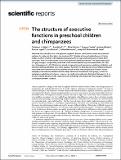The structure of executive functions in preschool children and chimpanzees
Abstract
Executive functions (EF) are a core aspect of cognition. Research with adult humans has produced evidence for unity and diversity in the structure of EF. Studies with preschoolers favour a 1-factor model, in which variation in EF tasks is best explained by a single underlying trait on which all EF tasks load. How EF are structured in nonhuman primates remains unknown. This study starts to fill this gap through a comparative, multi-trait multi-method test battery with preschoolers (N = 185) and chimpanzees (N = 55). The battery aimed at measuring working memory updating, inhibition, and attention shifting with three non-verbal tasks per function. For both species the correlations between tasks were low to moderate and not confined to tasks within the same putative function. Factor analyses produced some evidence for the unity of executive functions in both groups, in that our analyses revealed shared variance. However, we could not conclusively distinguish between 1-, 2- or 3-factor models. We discuss the implications of our findings with respect to the ecological validity of current psychometric research.
Citation
Voelter , C J , Reindl , E , Felsche , E , Civelek , Z , Whalen , A , Lugosi , Z , Duncan , L , Hermann , E , Call , J & Seed , A M 2022 , ' The structure of executive functions in preschool children and chimpanzees ' , Scientific Reports , vol. 12 , 6456 . https://doi.org/10.1038/s41598-022-08406-7
Publication
Scientific Reports
Status
Peer reviewed
ISSN
2045-2322Type
Journal article
Description
Funding: The research of A.M.S. was supported by an ‘INQMINDS’ ERC Starting Grant no. (SEP-210159400).Collections
Items in the St Andrews Research Repository are protected by copyright, with all rights reserved, unless otherwise indicated.

